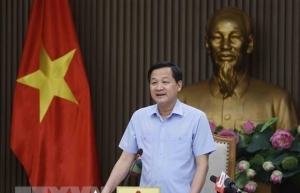INTERNATIONAL INVESTMENT
AND PORTAL
Tran Duc Huy, owner of a warehouse and logistics business in Ho Chi Minh City, said that according to the provisions of a previous government-led pandemic bailout, his business was qualified to benefit from it. However, although he contacted a bank that sent staff to work with him on the issue, no further feedback was offered for a month.
“This is not the first time. The policy is supposedly easy to apply, but when submitting the application, customers are struggling with it. Some banks asked us to show all our assets and ownership certificates, along with providing fees like appraisal and notarisation costs,” said Huy.
 Smaller enterprises sometimes lack the confidence or information to properly access loans, photo Le Toan
Smaller enterprises sometimes lack the confidence or information to properly access loans, photo Le Toan
Some other small- and medium-sized enterprises (SMEs) and cooperatives that have no assets or poor-value assets also cannot access the 2 per cent interest rate support package. Moreover, banks have almost expired credit room. Thus, it is difficult to borrow as normal.
According to the State Bank of Vietnam (SBV), as of end-October, only VND45 billion ($1.95 million) of interest rates supported businesses for total loans of VND21 trillion ($913 million), equalling 2.6 per cent of total loans and nearly 0.3 per cent of total supporting interest rate amount. October marked six months after Decree No.31/2022/ND-CP, on interest rate support from the state budget for bank loans extended to enterprises, cooperatives, and household businesses, came into effect.
Some business leaders are concerned over applying for the bailout for fear of post-inspection after receiving supporting interest rate loans. Bui Danh Lien, vice chairman of the Hanoi Transport Association, said that very few businesses are eligible for the supporting interest rate bailout. Some businesses in industries like transportation, warehousing, tourism, accommodation, catering, and education may be beneficiaries of the supporting interest rate bailout, but cannot meet the conditions.
“In 2021, most transport businesses had to suspend operations for a few months or even up to a year, so it is very rare for them to have no debt,” said Lien. “But Decree 31’s Article 4 stipulates that borrowers must meet the loan conditions of current laws, meaning no bad debt, reporting revenue, profit, and collateral.”
Pham Binh Minh-Deputy Prime Minister

Uncertainties are raising unprecedented challenges for us in implementing the goal of ensuring macroeconomic stability, controlling inflation, promoting economic growth, and carrying out the socioeconomic recovery and development programme. Therefore, Party General Secretary Nguyen Phu Trong highlighted one of the main tasks and solutions is improving the quality of lawmaking in association with improving effectiveness and efficiency in directing, implementing legal regulations, and promoting administrative reform.
The current context is an important and necessary test for a country’s legal system and policy response capacity. The legal framework must be flexible and pliable to withstand the storms of the times; law-building and improvement activities must focus on predictability, anticipating instability and new problems that may arise in socioeconomic development, so policies and laws must be stable with long-term existence, ensuring people and enterprises are confident to do business.
Supporting businesses to recover quickly and develop sustainably after the pandemic is an important task. Over recent years, legal support for businesses has achieved many positive results. In 2022 alone, the Ministry of Justice and other ministries and agencies reviewed nearly 22,000 relevant documents and proposed to add, amend, or annul nearly 6,000 documents that overlapped.
However, the business community faces woes during accessing supporting programmes of the government, and the performance of legal support and consulting activities is not very high. There are few resources for legal support for businesses and individuals, while demand is rising. Ministries, agencies, localities, industry associations, and organisations should provide more legal advice and support services with high quality and transparency.
Based on the needs of enterprises, they should propose synchronous, practical, and feasible support measures, probably focusing on increasing accessibility to legal support programmes and services, prevention and settlement of trade and investment disputes, and mitigating risks during participating in international economic integration.
Ministries, agencies, and localities should urgently study the comments of enterprises and provide a plan to support them. They should proactively identify and discuss legal difficulties, including accessing and using legal support means, and propose an effective way to support enterprises to build and strengthen the legal function. There must also be improvement in the capacity of self-protection so that they comply with the law and can identify, assess, prevent, and handle legal risks during operations, in both domestic and international markets.
Poor performance
At last week’s Business and Legal Forum 2022 held by the Ministry of Justice, Dau Anh Tuan, deputy general secretary of the Vietnam Chamber of Commerce and Industry, noted that there were legal obstacles in implementing the 2 per cent supporting interest rate.
“The source of support amount comes from the state budget with high risks, so commercial banks are afraid and even borrowers are very cautious due to possible post-inspection,” Tuan said. He added that the 2 per cent interest rate support package itself does not create motivation for enforcement because of a high risk placed alongside few benefits, and so commercial banks are not interested.
Ta Quang Don, director general of the SBV’s Department of Legal Affairs, said that for multi-sectoral businesses, splitting out of supporting interest industries and unsupportive ones is also a barrier to businesses’ access to the support. State agencies also have certain risks, especially on guidance on how to implement the policy properly.
“The executing state agency itself will also be subject to inspection by other ones. In order to reduce risks, we need more detailed recommendations and directions from higher-level authorities,” said Don.
Explaining the problems, Nguyen Minh Thao, head of Business Environment and Competitiveness at the Central Institute for Economic Management, said that bailouts are unprecedented and unspecified so that both businesses and authorities are confused during implementation.
“While enterprises are thirsty for capital, we should adjust regulations for them to easier to apply for the bailout and for banks to confidence to provide supporting interest rate loans,” said Thao. “When applying supporting policies, businesses always comply with the law and must not find ways to circumvent it. But during implementation, there could be some mistakes. Therefore, an inspection of authorities should focus on guiding businesses to do better instead of considering them as objects of a law violation.”
Adhering to principles
Recommending some solutions, Huy, director of the Ho Chi Minh City logistics company, said that the interest rate bailout should detail the ratio and the target amount of disbursement for SMEs, especially production businesses, because they need a lot of help at present. The SBV should also point out which businesses can receive bailout more specifically.
“If commercial banks cannot disburse the loans at the supporting interest rate, businesses are still stuck. This year is almost at an end and we have one more year to deploy the bailout, so performance and impact of the policy will not be as high as expected if legal regulations and obstacles are not loosened,” said Huy.
Economist Nguyen Tri Hieu said that credit institutions must adhere to the principle and be rigorously appraised. When borrowing from banks, borrowers must fully meet the regulations. He proposed allowing businesses to get loans through detailed business plans, proving cash flow within a year instead of just being based on guaranteed assets.
“If you want to implement interest rate support packages, the SBV should provide clearer policies for commercial banks, as well as specify in detail who can borrow or guarantee. The SBV should offer support if there is a risk during implementation,” recommended Hieu.
He added that the financial pressure on businesses is strong, and it is critical to secure capital for businesses in the time to come. The government should speed up the implementation of the Programme on Socioeconomic Recovery and Development, he said.
In early December, the government asked the SBV to work with localities to review and evaluate the process of implementing the interest rate bailout for businesses, as well as find new solutions.
In May, the government issued Decree 31 on the interest rate support package from the state budget applicable to loans of enterprises, cooperatives, and household businesses. The support period is from the date of loan disbursement to the time when the customer pays off the loan principal and/or interest as agreed between the commercial banks and the customers, in line with the funding source for interest support rates announced, but not exceeding the end of 2023.
 Support package creating momentum for growth
Support package creating momentum for growth
Vietnam’s economic growth is expected to stay at a positive level this year on the back of a national gigantic support package and normalisation of activities within the country.
 Deputy PM’s conclusions on interest rate support package
Deputy PM’s conclusions on interest rate support package
The Government Office has issued an announcement on Deputy Prime Minister Le Minh Khai’s conclusions at a meeting on interest rate support package in accordance with the Government’s Decree No.31/2022/ND-CP dated May 20.



















